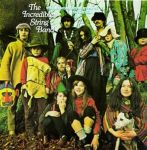|
by The Incredible String Band  Perhaps Their Most Successful Effort to Abolish Time
Perhaps Their Most Successful Effort to Abolish Time
I will never forget the first time that I heard the Incredible String Band's album The Hangman's Beautiful Daughter. In 1979, my wife Fayaway and I were on a tour of sacred sites and places rumored to have high levels of paranormal activity. We were driving through Illinois to visit Cahokia Mounds State Park, and I had slept through most of the night while she drove. Toward dawn, I began to dream that a giant ameboid creature had risen from the hills and set out across the world. It travelled over the globe, and in every country where its pseudopodia touched earth, it picked up a musical instrument from that region and carried it along. Soon its gelatinous body was covered with woodwinds, stringed instruments, percussives, bagpipes and keyboards from every corner of the map, and every time it touched the earth, one of those instruments would give voice to a scrap of melody or song. As it passed through the hills and valleys, along lochs and down through wadis, sliding over the Andes or slithering through Piccadilly Circus, it left a trail of liquid music, a mosaic of scraps and fragments picked up in scattered countries and unimaginable lands. As it did so, it greened the hills over which it passed, gladdened the hearts of those who heard its music, and shaped the bits and pieces of the world's musics into a harmonious whole, a constantly shifting structure, never finished, never coming to rest, and yet somehow reflecting the perfection of the cosmos and the beauty of a world that existed before our fall from grace. I awoke then, and as I gathered my wits about me, I realized that the music I had heard in my dream was in fact not originating from some friendly protozoa, but rather from the stereo speakers in our vehicle. While I slept, my wife had slipped in a tape of The Hangman's Beautiful Daughter, and my entire dream had been inspired by the fluid rhythms of "Koeeoaddi There." Joy, loss, and above all, recognition swept through me as I listened for the first time to that music. Perhaps because it was the first Incredible String Band album I heard, this one is still my favorite. The quirky rhythms, strange harmonies, and seemingly random lyrics imbue this album with a vibrancy that is rare in more conventional music. I am forever grateful to Robin Williamson and Michael Heron for allowing me to glimpse the secret worlds that lie all around us, hidden to our ordinary sight. The essence of their unique vision has always been a denial of the nature of time, and this album, more than any other, manifests that idea. Even as they sing of their childhoods, their presents and futures, and worlds alongside, inside, or parallel to our own, as yet unknown except to madmen, dreamers, and poets, so do their harmonies, time signatures and drumbeats conjure up a world that challenges our understanding of the fourth dimension. Like Marcuse, who theorizes that the capitalist state will collapse only when we are too busy playing to participate in its folly, these mad jugglers of song and story, whimsical wise men of twilight and ebbtide, likewise destroy western civilization's Great Work of Time by refusing to recognize its empty meaning. "Koeeoaddi There" and "Swift as the Wind" are both fantastical refigurings of childhood, such that they seem as if they live it still; "The Minotaur's Song" sounds as if it were a piece from an epic/opera written by Gilbert & Sullivan in the Golden Age. Who among us does not recognize the hidden omen in the words "Next week a monkey is coming to stay"?--it is so clearly a reference to coming of age, which Robin shrugs off with a carefree string of wordless mouthings: he invokes nonsense to vanquish death. These and many other lyrical turns are set against their amazing music, which, in its ever-changing rhythms and notations, is itself a rejection of formal time. So their songs go ever onward, somehow alive, carrying within them the meaning of lost childhood, forgotten dreams, as-yet-untasted fruit in foreign orchards, and never demanding that we pay the piper who waits outside the gates of dawn. |

